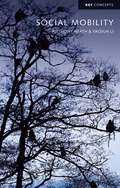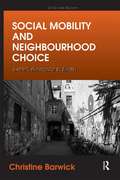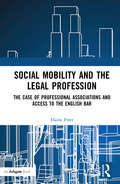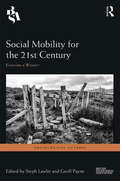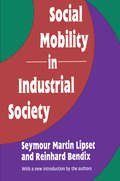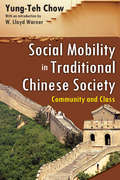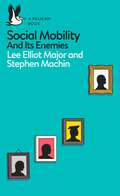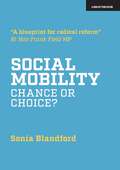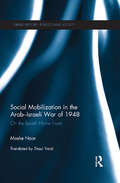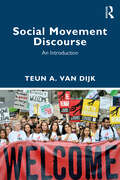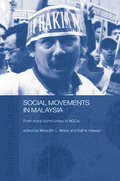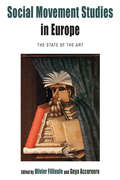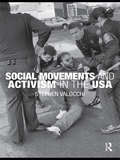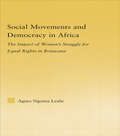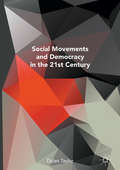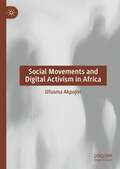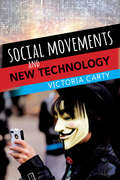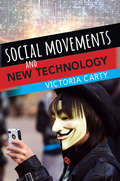- Table View
- List View
Social Mobility (Key Concepts)
by Anthony Heath Yaojun LiSocial mobility has long been one of the central topics of sociology. It has been the subject of major theoretical contributions from the earliest generations of scholars, as well as being of persistent political interest and concern. Social mobility is frequently used as a key measure of fairness and social justice, given the central role that modern liberal democracies give to equality of opportunity. More pragmatically, policymakers often consider it a force for economic growth and social integration. However, discussions of social mobility have increasingly become dominated by advanced statistical techniques, impenetrable to all but specialists in quantitative methods. In this concise and lucid book, Anthony Heath and Yaojun Li cut through the technical literature to provide an eye-opening account of the ideas, debates and realities that surround this important social phenomenon. Their book illuminates the major patterns and trends in rates of social mobility, and their drivers, in contemporary western and emerging societies, ultimately enabling readers to understand and engage with this perennially relevant social issue.
Social Mobility and Neighbourhood Choice: Turkish-Germans in Berlin (Cities and Society)
by Christine BarwickWhat are the consequences of staying in or moving out of a socioeconomically disadvantaged neighbourhood? In European urban sociology, research has mostly focused either on lower class ethnic minorities, or on white ethnic majority middle classes. By contrast, studies on upwardly mobile ethnic minorities are scarce, a gap that this book fills by looking at upwardly mobile Turkish-Germans living in Berlin. Those Turkish-Germans in Berlin, who decide to move out of a low status neighbourhood, mostly in order to find a better educational infrastructure for their children, show various strategies to keep ties back to their old neighbourhood. Moreover, the movers now living in neighbourhoods with a high share of native-German residents, where they stand out as the other, keep ties to other people with a Turkish background, not only through socializing with co-ethnics, but also through various forms of voluntary involvement. Hence, a move presents a spatial withdrawal from a socioeconomically weak and ethnically diverse neighbourhood, but it does not imply that this neighbourhood no longer plays a role in Turkish-Germans’ daily practices or as somewhere with which to continuously identify. Barwick’s sophisticated study shows that moving and staying are both active decisions and they both have positive and negative consequences. Thus, movers and stayers alike develop coping strategies for their respective situation, and develop particular daily practices and forms of identification with place.
Social Mobility and the Legal Profession: The case of professional associations and access to the English Bar
by Elaine FreerThis book will be crucial reading for students across a variety of disciplines. A broadly socio-legal text, using a mixed-methods design combining grounded theory with an in-depth case study, this research explores a rarely-seen facet of the legal profession. Sociologists studying the practical effect of sociological concepts from theorists such as Bourdieu and Weber; those studying the legal profession from the sociological, law or psychological angles; anyone examining elite professions; management students examining the operation of professional associations and the ways in which these mobilise to take action on controversial topics; those studying the role and creation of outreach: all will find something of interest in this monograph. For those within the legal profession itself it also provides a look into an oft-hidden world: that of the English Bar. A notoriously secretiveprofession, traditional, elite and suspicious of research – the case study evaluatingan outreach programme sheds light on how this fascinating world operates when trying to engage in progressive steps. Through the eyes of a professional association seeking to improve socio-economic diversity in the profession through instituting an access programme focussed on work experience, it examines not just how professional association action may succeed or fail, but why. With foreword by Lord Neuberger, former President of the Supreme Court and Chair of the Working Party on Entry to the Bar.
Social Mobility for the 21st Century: Everyone a Winner? (Sociological Futures)
by Steph Lawler Geoff PayneSocial Mobility for the 21st Century addresses experiences of social mobility, and the detailed processes through which entrenched, intergenerationally transmitted privilege is reproduced. Contributions include (but are not limited to) family relationships, students’ encounters with higher education, narratives of work careers, and ‘mobility identities’. The book intends to challenge both the framework of the more traditional approach, and the politicisation of mobility which casts ‘mobility’ as a possession, a commodity or a character trait, and threatens to castigate the ‘non-mobile’ as carrying a personal responsibility for their situation. This book presents critical analyses of routes into social mobility, the experience of social mobility, and the political and social implications of social mobility’s ‘panacea’ status. Drawing on the work of established scholars and more recent entrants, the chapters offer a fresh look at social mobility, opening up the topic to a wider readership among the profession and beyond, and stimulating further debate. This book will appeal to higher level students and scholars of sociology alike, as well as having a broad cross-disciplinary appeal.
Social Mobility in Industrial Society
by Seymour Martin Lipset Reinhard BendixIn a careful analysis of the existing literature, the authors marshal an imposing array of evidence in support of their major argument that social mobility is an integral and continuing aspect of the process of industrialization. This classic volume continues to be a basic reference source in the field of occupational mobility.
Social Mobility in Traditional Chinese Society: Community and Class
by Yung-Teh ChowThis authoritative volume - a large-scale empirical work comparable to Pitirim Sorokin's Social Mobility - is a penetrating and comprehensive study of social stratification and mobility in traditional Chinese society and a highly significant addition to the theoretical and factual foundations of contemporary social science. It offers an authentic portrayal not only of social mobility but of social life in China in general at the time of its original publication in the 1960s.It includes the life histories of the upper class - scholars, active and retired officials, merchants, and wealthy landlords - and an analysis of social statistics drawn from one Chinese county, which provides new interpretations of the processes of social mobility, the relationship of this class to society as a whole, and the motives of upwardly mobile individuals. Each life history comprises at least five generations and its resulting accounts touch upon the lives of 1,200 persons, and help place the development of the gentry in illuminating context within the population as a whole.Chow's book offers a welcome method of comparison of two societies that have both birth and mobile elites. As China entered the world system, its open class system changed from fluidity to disorganization regarding its character. As such it was transformed into an innovating society in which the earlier system could not, or did not, work. Social Mobility in Traditional Chinese Society is unique in its field for the successful correlation of conceptual framework with its detailed wealth of empirical findings. It will be welcomed by all students of social science, international relations, and Asian studies.
Social Mobility: And Its Enemies (Pelican Books)
by Stephen Machin Lee Elliot MajorWhat are the effects of decreasing social mobility?How does education help - and hinder - us in improving our life chances?Why are so many of us stuck on the same social rung as our parents? Apart from the USA, Britain has the lowest social mobility in the Western world. The lack of movement in who gets where in society - particularly when people are stuck at the bottom and the top - costs the nation dear, both in terms of the unfulfilled talents of those left behind and an increasingly detached elite, disinterested in improvements that benefit the rest of society.This book analyses cutting-edge research into how social mobility has changed in Britain over the years, the shifting role of schools and universities in creating a fairer future, and the key to what makes some countries and regions so much richer in opportunities, bringing a clearer understanding of what works and how we can better shape our future.
Social Mobility: Chance or Choice?
by Sonia BlandfordSocial Mobility: Chance or Choice?, a sequel to `Born to Fail? Social Mobility, a Working Class View' (October 2017), sets out the current chances and choices available for those considered by the establishment to need social mobility. Revisiting mutuality, Sonia Blandford asks whether we care enough as a society by considering the issues, solutions and impact to the education and social issues that push against the chance or choice of social mobility. Citing the views from interviews with education and business leaders, Social Mobility: Chance or Choice? reflects on the changing skillsets and capacities of workers required by employers, business and industry and the inescapable conclusion that the skillsets and capacities will continue to change in ways that are almost impossible for us to predict. In these contexts, we must question whether the traditional acme and 'recognised journey' of educational achievement – maximising university entrance – is still relevant or useful for working-class children and young people and children facing disadvantage. Apprenticeships, at their best, can offer an updated and forward-facing solution to the providing choice for working-class and all children and young people. Despite current policy developments to encourage meaningful apprenticeships, apprenticeship programmes are experiencing challenges. Social Mobility: Chance or Choice? argues that applied learning and work-based learning should be more accessible and available to all children and young people. If we are serious about unleashing the talent of all children and young people, regardless of their background, challenges or needs, we must consider new and innovative approaches to post-14 education. If we are to unleash the potential of all children and young people, the role of Further Education needs to be respected and understood. Quality Further Education and training in partnership with business is a credible answer to social mobility. Further Education is an underused but ideally placed sector to develop meaningful change for working-class young people, providing real chances and choices. Beginning with Leaders - professionals, practitioners, parents or carers, and members of society have a shared responsibility to ensure that all children and young people have a right to chance or choice and support these opportunities. Building a society that is truly inclusive.
Social Mobility: Chance or Choice?
by Sonia BlandfordSocial Mobility: Chance or Choice?, a sequel to `Born to Fail? Social Mobility, a Working Class View' (October 2017), sets out the current chances and choices available for those considered by the establishment to need social mobility. Revisiting mutuality, Sonia Blandford asks whether we care enough as a society by considering the issues, solutions and impact to the education and social issues that push against the chance or choice of social mobility. Citing the views from interviews with education and business leaders, Social Mobility: Chance or Choice? reflects on the changing skillsets and capacities of workers required by employers, business and industry and the inescapable conclusion that the skillsets and capacities will continue to change in ways that are almost impossible for us to predict. In these contexts, we must question whether the traditional acme and 'recognised journey' of educational achievement – maximising university entrance – is still relevant or useful for working-class children and young people and children facing disadvantage. Apprenticeships, at their best, can offer an updated and forward-facing solution to the providing choice for working-class and all children and young people. Despite current policy developments to encourage meaningful apprenticeships, apprenticeship programmes are experiencing challenges. Social Mobility: Chance or Choice? argues that applied learning and work-based learning should be more accessible and available to all children and young people. If we are serious about unleashing the talent of all children and young people, regardless of their background, challenges or needs, we must consider new and innovative approaches to post-14 education. If we are to unleash the potential of all children and young people, the role of Further Education needs to be respected and understood. Quality Further Education and training in partnership with business is a credible answer to social mobility. Further Education is an underused but ideally placed sector to develop meaningful change for working-class young people, providing real chances and choices. Beginning with Leaders - professionals, practitioners, parents or carers, and members of society have a shared responsibility to ensure that all children and young people have a right to chance or choice and support these opportunities. Building a society that is truly inclusive.
Social Mobilization in the Arab/Israeli War of 1948: On the Israeli Home Front (Israeli History, Politics and Society)
by Moshe NaorIn many ways, the Arab-Israeli war of 1948 is typical of the total military conflicts that characterized the first half of the twentieth century. However, in addition to the military course of the war, and its formative and revolutionary ramifications, this war was also notable for the social mobilization of the Israeli population. Social Mobilization in the Arab-Israeli War of 1948 focuses on these civilian aspects of the war, the involvement of the Israeli home front in the fighting and the participation of society in the process of mobilization. Israeli civil society organizations played an active and central role in mobilizing the economy for the war effort, mobilizing personnel for military service, for labor and for the emergency services, and in organizing the home front. The function of Israeli society and civil organizations in processes of mobilization, conducted against the background of the end of the British mandate and the establishment of the State of Israel, was one of the principal factors that contributed to the Israeli military victory in the 1948 war. Civilian aspects of the 1948 war have received little attention, despite the opening of the archives in the 1980s. As such, Social Mobilization in the Arab-Israeli War of 1948 is an important contribution, particularly for those interested in Israeli History, Jewish History, Middle Eastern History, the Arab-Israeli conflict and War Studies.
Social Morphology, Human Welfare, and Sustainability
by Shouraseni Sen Roy Mohammad Izhar Hassan Uday Chatterjee Samik Chakraborty Uttara SinghThis volume discusses a broad range of human welfare problems associated with and stemming from social issues, natural resource deficiencies, environmental hazards, vulnerability to climate change, and sustainability challenges. The chapters form a framework centered around the concept of social morphology, i.e. the role of humans in shaping society, and associated human-nature interactions which inform the ability to achieve sustainable welfare and well-being. The book is divided in six sections. Section I contains the introductory chapters where the book explores shifting interfaces between environment, society, and sustainability outcomes. Section II discusses contemporary issues of social welfare, and covers sustainable approaches in geo-heritage and ecotourism. Section III addresses the roots of various social conflicts and inequalities in relation to overpopulation, poverty, illiteracy, employment concerns, and human migration. Section IV highlights social security and areas of social deprivation, including urban affordability, gender equality, and women’s health. Section V covers social issues resulting from natural hazards and disasters. Section VI concludes the book with a discussion of the way forward for social sustainability. The book will be of interest to students, researchers, policy makers, environmentalists, NGOs, and social scientists.
Social Movement Campaigns on EU Policy (International Political Economy Series)
by Louisa ParksThis book investigates if and how social movement campaigns influence European policy, a particularly pertinent question in today's political climate of disillusionment with Europe in many member states. Using a range of campaigns launched by social movement organisations, from genetically modified organisms and Internet freedom to trade union rights and water rights, Parks elucidates the important differences between technical and political campaigns. Technical campaigns are characterised by extended engagement with consultation mechanisms and the production of expert information, particularly for the European Commission. In political campaigns, social movement organisations target the EU at national and local levels, using strategies reminiscent of social movements as they are more commonly known. A comparison of the campaigns suggests that targeting member state governments with protest and harnessing public opinion is central to securing influence over EU policy, and that where national and local levels are made integral to efforts in shaping European policy, influence is more likely.
Social Movement Discourse: An Introduction
by Teun A. van DijkThis is both the first systematic introduction to Discourse Studies for students and scholars of social movements and a study of discourses on the European "refugee crisis", by leading theorist, Teun A. van Dijk. Concrete examples of different kinds of discourse are vital for the study of social movements because their activities are not limited to such well-known forms of contention as marches, occupations or strikes, but also daily discursive activities, such as meetings, assemblies, interviews, press conferences, manifestos, pamphlets, banners, graffiti, websites, blogs, social media posts and everyday talk. This book proposes that empirical analyses of these discourses should go beyond the popular but vague notion of "frame" and engage in more detailed and explicit analyses of the text and talk of social movements. This is a much-needed introduction to the most important structures of discourse and a detailed theoretical account of the notion of "solidarity" defining the Refugees Welcome movement.
Social Movement Discourse: An Introduction
by Teun A. van DijkThis is both the first systematic introduction to Discourse Studies for students and scholars of social movements and a study of discourses on the European “refugee crisis”, by leading theorist, Teun A. van Dijk.Concrete examples of different kinds of discourse are vital for the study of social movements because their activities are not limited to such well-known forms of contention as marches, occupations or strikes, but also daily discursive activities, such as meetings, assemblies, interviews, press conferences, manifestos, pamphlets, banners, graffiti, websites, blogs, social media posts and everyday talk.This book proposes that empirical analyses of these discourses should go beyond the popular but vague notion of “frame”and engage in more detailed and explicit analyses of the text and talk of social movements.This is a much-needed introduction to the most important structures of discourse and a detailed theoretical account of the notion of “solidarity” defining the Refugees Welcome movement.
Social Movement Malaysia: From Moral Communities To Ngos
by Meredith L. Weiss Saliha HassanThis book considers the proliferation in Malaysia over the past two decades of non-governmental organizations (NGOs) associated with various social movements, both to provide basic information about the NGOs and social movements, and to discuss their role in the development of civil society generally in particular their contribution to the reform movement, which has been gathering strength since 1998. The book discusses the nature and development of the movements, and shows that those movements concerned with human rights and women's issues have made significant contributions to the reform movement and been irrevocably changed by their involvement in it.
Social Movement Studies in Europe: The State of the Art
by Olivier Fillieule Guya AccorneroBringing together over forty established and emerging scholars, this landmark volume is the first to comprehensively examine the evolution and current practice of social movement studies in a specifically European context. While its first half offers comparative approaches to an array of significant issues and movements, its second half assembles focused national studies that include most major European states. Throughout, these contributions are guided by a shared set of historical and social-scientific questions with a particular emphasis on political sociology, thus offering a bold and uncommonly unified survey that will be essential for scholars and students of European social movements.
Social Movements and Activism in the USA
by Stephen ValocchiWhat can we learn when we listen closely to and engage in dialogue with social movement activists? Social Movements and Activism in the USA addresses this question for a group of progressive activists in Hartford, Connecticut, who do community, labor, feminist, gay and lesbian, peace, and anti-racist organizing. Situated within the twenty-first-century landscape of post-industrialism and neo-liberalism and drawing on oral histories, the book argues for a dialogic and integrative approach to social movement activism. The dialogue between scholar and activist captures the interpretive nature of activists' identity, the variable ways activists decide on strategies and goals, the external constraints on activism, and the creative ways activists manoeuvre around these constraints. This dialogic approach makes the book accessible and useful to students, scholars, and activists alike. The integrative nature of the text refers to its theoretical approach. Rather than advancing a new theory of social movements, it uses existing approaches as a tool kit to examine the what, how, who, and why of social movement activism.
Social Movements and Democracy in Africa: The Impact of Women's Struggles for Equal Rights in Botswana (African Studies)
by Agnes Ngoma LeslieThis book examines social movements in Africa, analyzing how they emerge and how they may impact public policy, the legal and political situation, and the society by focusing on the following question: How do women's political and legal rights get extended and institutionalized in a patriarchal democratic society?
Social Movements and Democracy in the 21st Century
by Dylan TaylorThis book contends that the impasse of the Left today is in part, a result of an anarchist 'common sense' among activists. The author argues that the vital dynamics of anarchism and social movements need to be combined with a reappraisal of the Communist party and state. While cynicism towards capitalism and existing political institutions is plentiful, this book argues that the Left appears mired in a reactive politics of resistance, unable to formulate programmes for substantive social change. Drawing insights from the history of the Left, political economy, contemporary critical theory and an in-depth study of Occupy, the author provides concrete suggestions as to how the Left might 'claim the twenty-first century' and realise a more equitable social order. Social Movements and Democracy in the 21st Century challenges activists and scholars to rethink social movements and political organisation, and to actively work towards enduring social change. The book will be of interest to students and scholars of social movement studies, Left theory, critical theory, political sociology and Marxism, as well as anyone with an interest in 'political change'.
Social Movements and Digital Activism in Africa
by Ufuoma AkpojiviThis book analyses social movements, digital activism and protest actions in Africa using a de-colonial approach, with selected case studies of #BringBackOurGirls, #OurMumuDonDo, #FeesMustFall, and #OccupyGhana from Nigeria, South Africa and Ghana. This book examines the ideological background of social movements and the broader micro/macro structures that exist within these movements and how these structures shape their engagement with state and non-state actorsThe author argues that the ideological orientation of movement founders influenced the broader belief of each movement, which in turn shaped the micro and macro structure and relationships of the movements and their engagement with the state. Furthermore, the author argues that not all movement members aligned with the movement's ideological belief, thus the disconnect and contestation within these movements. This book provides much-needed systematic, critical review and cutting-edge research into the ideology, practices, performance, and trends of social and digital movements in Sub-Saharan African countries.
Social Movements and New Technology
by Victoria CartyThe emergence of new information communication technologies--such as the Internet and social media networking sites and platforms--has strongly affected social movement activism. In this compelling and timely book, Victoria Carty examines these movements and their uses of digital technologies within the context of social movement theory and history. With an accessible and unique mix of theory and real-world examples, Social Movements and New Technology takes readers on a tour through MoveOn and Tea Party e-mail campaigns, the hacktavist tactics of Anonymous, global online protests against rapists and rape culture, and the tweets and Facebook pages that accompanied uprisings across the Arab world, Europe, and the United States. In each case study, the reader is invited to examine the movement, organization or protest and their use of digital tools through the lens of social movement theory. Discussion questions at the end of each chapter invite critical thinking and further reflection and debate.
Social Movements and New Technology
by Victoria CartyThe emergence of new information communication technologies-such as the Internet and social media networking sites and platforms-has strongly affected social movement activism. In this compelling and timely book, Victoria Carty examines these movements and their uses of digital technologies within the context of social movement theory and history. With an accessible and unique mix of theory and real-world examples, Social Movements and New Technology takes readers on a tour through MoveOn and Tea Party e-mail campaigns, the hacktavist tactics of Anonymous, global online protests against rapists and rape culture, and the tweets and Facebook pages that accompanied uprisings across the Arab world, Europe, and the United States. In each case study, the reader is invited to examine the movement, organization or protest and their use of digital tools through the lens of social movement theory. Discussion questions at the end of each chapter invite critical thinking and further reflection and debate.
Social Movements and New Technology: Social Movements, New Technology, And Electoral Politics (Routledge Studies In Science Technology And Society Ser.)
by Victoria CartyThe emergence of new communication technologies (such as the Internet and social media networking sites and platforms) has strongly affected social movement activism. In this compelling and timely book, Victoria Carty examines these movements and their uses of digital technologies within the context of social movement theory and history. With an accessible and unique mix of theory and real-world examples, Social Movements and New Technology takes readers on a tour through MoveOn and Tea Party e-mail campaigns, the hacktivist tactics of Anonymous, global online protests against rapists and rape culture, and the tweets and Facebook pages that accompanied uprisings across the Arab world, Europe, and the United States. In each case study, the reader is invited to examine the movement, organization, or protest and their use of digital tools through the lens of social movement theory. Discussion questions at the end of each chapter invite critical thinking, further reflection, and debate.
Social Movements and Political Activism in Contemporary Japan: Re-emerging from Invisibility (The Mobilization Series on Social Movements, Protest, and Culture)
by David Chiavacci Julia ObingerThis book explores social movements and political activism in contemporary Japan, arguing that the 2011 Fukushima nuclear accident marks a decisive moment, which has led to an unprecedented resurgence in social and protest movements and inaugurated a new era of civic engagement. Offering fresh perspectives on both older and more current forms of activism in Japan, together with studies of specific movements that developed after Fukushima, this volume tackles questions of emerging and persistent structural challenges that activists face in contemporary Japan. With attention to the question of where the new sense of contention in Japan has emerged from and how the newly developing movements have been shaped by the neo-conservative policies of the Japanese government, the authors ask how the Japanese experience adds to our understanding of how social movements work, and whether it might challenge prevailing theoretical frameworks.
Social Movements and Protest
by Gemma EdwardsThis lively textbook integrates theory and methodology into the study of social movements, and includes contemporary case studies to engage students and encourage them to apply theories critically. A wide range of protest cases are explored, from American, European and global arenas, including contemporary examples of political violence and terrorism, alter-globalisation, social networking and global activism. Key chapter features encourage students to engage critically with the material: method points uncover the methodology behind the theories, helping students to understand the larger study of social movements; debate points highlight classic arguments in social movement studies, encouraging students to critically assess theoretical approaches; and case studies connect theories to cases, allowing students to relate key principles to real-world examples. A companion website offers additional student and instructor resources, including lecture slides and worksheets.
